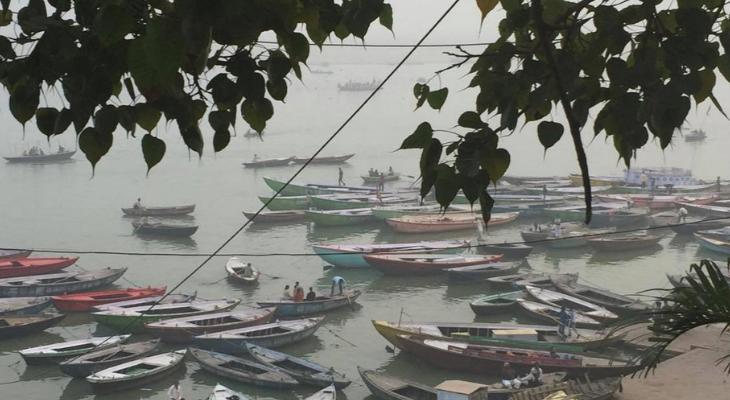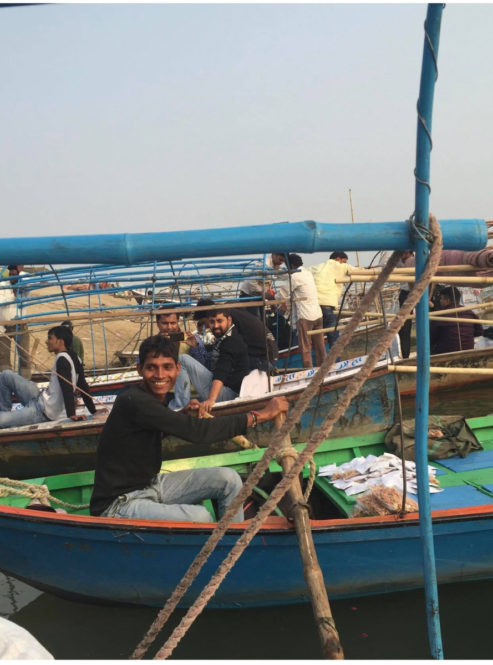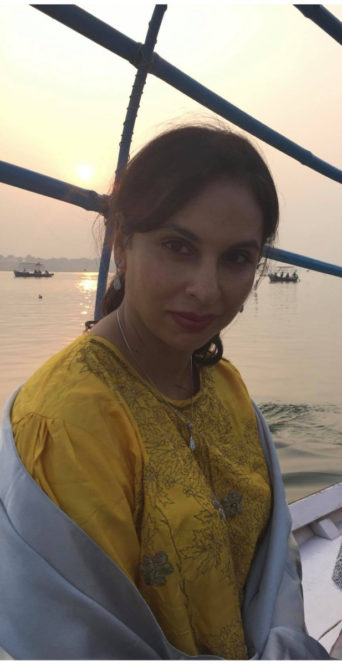Reflecting on Death at the Edge of the Ganga
October 29, 2021

I only vaguely remember the discussions around a trip to India to scatter my Mum’s ashes in the Ganga River. I was still in a mist of grief, waxing between peace & acceptance and acute, searing anxiety … but I recall a strong urge to go.
My mother was the matriarch of not just our nuclear unit, but her wider clan in India, whose lives were carved and framed by her influence, provision and oversight. These would be their moments, as much as ours. It was the first time I had given much thought to Hindu cultural death rites. I saw my mother’s spirituality broaden in her last days. Yet, the scattering of parts of her ashes in the Ganga was the natural culmination of her Hindu heritage and my father’s deep knowledge of Hindu life cycles and their rituals. Cremation allows dissemination, and parts of her ashes were scattered through sites in Auckland, New Zealand where she had resided. Just as she lived, impelling and shaping lives on either side of the Indian Ocean.
There is a surreal, spiritual ambiance to the Ganga River system. The junction of Jamuna and Ganga is in Allahabad, coincidentally where my parents studied and my dad worked, and where I lived for a year when I was four years old. It is called the Triveni Sangam, the “tri” being Sanskrit for ‘three’, the third river being an invisible, mystic river called the Saraswati. My family members are Hindu and believe that one is released from the cycle of birth and death if buried here. I am not Hindu and had no preconceived ideas or expectations of this place, but even I was struck by the feeling of peace and poignancy on arriving. There is a large sandy foreshore, and, despite the presence of the typical life and color of India, there is a peaceful stillness in the atmosphere, a quiet reflection that is neither morose nor brooding but just gently soothing. Small boats sit on the water’s edge and silhouette against a grey sky. Dark figures, draped in loose jewel-toned cotton, dot the sandy plain leading down to the water. We hired a boat, and we were sold food to feed the seagulls.
Share

Living in Australia, seagulls have no particular charm, but these Siberian seagulls are handsome creatures, and the locals get very enamored by them surrounding the boat in a feeding frenzy as morsels into the air. The water of the Yamuna is a dove grey, and there is a visible demarcation line where the rivers meet, beyond which the Ganga shimmers as an eggshell white. A dhoti-clothed pandit with a holy tika mark on his forehead leads us through the prayers and rituals. As Mum’s ashes are opened and my brother starts to lift them out, the Pandit stops his prayers and insists we commit to a particular price rise, higher than the agreed amount. My aunt who lives here knows the deal, and tells him: “please continue, you will get well rewarded, please don’t stop.” He interrupts proceedings a few times. This is India, spiritual and material, side by side, almost inseparable.
We buy a bottle to take some of the river away for my aunt; however, we change our minds about this irreverent activity and hand the bottle, for which we paid 20cents (10 rupees) back to the teenage boy selling them. He refunds our money and refuses to accept a donation. My cousins advise me that even hard-pressed working-class people have dignity and won’t take your money without working for it. It reminds me of the many times similar things have happened. Money is often not talked about until the thin edge of the wedge, a taxi driver won’t tell me the cost, ‘you are family (I’m not) and I can even do this for free. He doesn’t mean this, of course, but is part of the sense of family love, duty and connection that epitomizes India. This is also India, dignity, generosity, kindness.
I was born in New Zealand and became a Christian through the western framework, one that has culturally been wary of engaging meaningfully with other faiths. With maturity comes nuance. I’ve gone from rejection to respect & appreciation of, if not conversion back to, my Hindu heritage; the complexity and intricacy of the ideology, the sublime poetry of its scriptures, the delineation of the karmic nature of our actions.

The author, Rashmi Dixit, at the Ganges River.
As I reflect on the scattering of my own mother’s ashes on Mata Ganga, the Mother Nature of India, I am cognizant of why Christ himself died. Rather than individual karma, Christ proclaims humankind in toto has been in rebellion to God, since nascency. An ancestral portal for evil thus opened, and in slid sickness, death and suffering, landing indiscriminately yet unevenly, on all. The self-soothing, clear karmic link between the sufferer and their malaise is replaced by a muddy opacity, the unanswered pleading of “but, why me?” Yet as he died on the cross, Original Sin was paid for, & the schism repaired. A bridge is built to a perfect tomorrow, if I choose to walk its narrow path. As he said on the cross: “It is finished.”
Rashmi Dixit is a pediatrician, an infectious diseases specialist, with a strong interest in metabolic medicine. Receiving her medical degree from the University of Auckland, she has two Australasian fellowships in Pediatric Infectious Diseases and Travel & Tropical Medicine, and a PhD from Sydney University (Influenza in Vulnerable Populations). She is a committed Christian of Hindu heritage.



